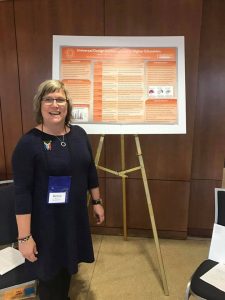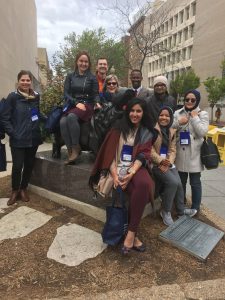An accountant, a traveling physical therapist, and Director of Disabilities Support for a University—three very different careers offering a multitude of life experiences that Hetsie Veitch is now sharing with classmates, professors, and staff at the School of Education. While all in some way contributed to Veitch’s current pursuit as a Ph.D. candidate in the Cultural Foundations in Education (CFE) program, it was her most recent work supporting students with disabilities at the University of the Free State in South Africa that really activated her desire to continue her education.
 Seeing and experiencing the gaps in research related to social justice and disability in her country, Veitch realized the need to dig deeper. “South Africa doesn’t currently have the needed legislation in place to address disabilities in higher education and civil society in general, especially when it comes to the intersection of race and disability. I want to be a part of shaping the discourse around the implementation of new policy and look at the best ways that South Africa can address these needs at every level.” Keeping in line with this, part of Veitch’s dissertation will focus on discourse around marginalized people because as she notes, “Language is what gives issues life.”
Seeing and experiencing the gaps in research related to social justice and disability in her country, Veitch realized the need to dig deeper. “South Africa doesn’t currently have the needed legislation in place to address disabilities in higher education and civil society in general, especially when it comes to the intersection of race and disability. I want to be a part of shaping the discourse around the implementation of new policy and look at the best ways that South Africa can address these needs at every level.” Keeping in line with this, part of Veitch’s dissertation will focus on discourse around marginalized people because as she notes, “Language is what gives issues life.”
After being selected to join the Fulbright Foreign Student Program, Veitch had her pick of some of the most prestigious programs in the United States. She explains what attracted her to the CFE program saying, “I thought I was going to have to make a big mind shift into academia but CFE makes provision for different approaches and it encourages interdisciplinary scholarship which is ideal for the way that I work and what I eventually want to do, especially with regard to social justice. I’m so happy that SU came through in the end. Academically, this really is the best match for me.”
Veitch’s holistic approach to her coursework also extends into her extracurricular endeavors. As one of the co-presidents of SOE’s Graduate Student Council, she represents her fellow SOE graduate students when lobbying for funds to hold workshops and monthly meeting sessions focused on priority topics for her classmates. She notes that, “Dean Masingila supports the council in their efforts, often holding Q&A sessions for whatever is on students’ minds.”
 In fact, the SOE International Student Peer Mentor Program that Veitch helped to establish during the 2016/2017 school year came from a conversation that she had with Dean Masingila about the challenges that international students face upon arrival at SU. From tricky visa stipulations to helping partners who are along for the journey adjust to their new surroundings and find employment, Veitch knows first-hand that committing to an international academic program, while exciting, does not come without its challenges. The program addresses these obstacles by connecting international students with current students to establish friendships that will ease their transition to academic study in the US and life in Syracuse. The program’s implementer, SOE assistant director of graduate admissions and recruitment, Speranza Migliore, attests to Veitch’s dedication as a student leader saying, “She cares deeply about the challenges faced by incoming international students and provides integral support for coordinating this program.”
In fact, the SOE International Student Peer Mentor Program that Veitch helped to establish during the 2016/2017 school year came from a conversation that she had with Dean Masingila about the challenges that international students face upon arrival at SU. From tricky visa stipulations to helping partners who are along for the journey adjust to their new surroundings and find employment, Veitch knows first-hand that committing to an international academic program, while exciting, does not come without its challenges. The program addresses these obstacles by connecting international students with current students to establish friendships that will ease their transition to academic study in the US and life in Syracuse. The program’s implementer, SOE assistant director of graduate admissions and recruitment, Speranza Migliore, attests to Veitch’s dedication as a student leader saying, “She cares deeply about the challenges faced by incoming international students and provides integral support for coordinating this program.”
Now acting as a mentor herself, Veitch always likes to remind other international students, “It’s easy to forget that Americans have just as much to learn from us as we have to learn from being here. Every time I’m talking to someone about South Africa and they say, ‘Wow, I didn’t know that’, it makes me happy because I taught someone something about my country.”
She brings this same unique international perspective to the classes that she co-teaches with her advisor, professor Alan Foley, and as a graduate research assistant for The Lender Center for Social Justice. The center promotes robust dialogue around issues of justice, equity, and inclusion, three things that Veitch is most passionate about. And it’s not only the research itself she feels strongly about, it’s also the way in which it is conducted.
Referencing SOE’s long-standing relationship with Kenyatta University as an example, Veitch explains, “I want to develop long-term research relationships in my work. All too often you see researchers who will do a brief residency, conduct their research in an area and then move on when their time or funding concludes. I want to commit to addressing the issues I am researching and work to see things improve when it comes to justice and equality in my country, but also be a part of a larger community of professionals working to address these struggles worldwide.”
Sharing what she refers to as the most important lesson from her time at SOE Veitch says, “When you do research, you’re working with people, learning from their experiences, not simply researching them. That power relationship between you as a researcher and the participants is a relationship that needs to be managed very carefully and treated with the highest regard,” says Veitch.
Crediting Marcelle Haddix, Dean’s Professor and Co-Director of The Lender Center with punctuating this point for her, Veitch notes the professor’s habit of going to great lengths to ensure representation and participation of marginalized communities and students. Having been passionate about this in her own career in higher education, Veitch remarks, “It’s easy at big institutions, especially private institutions where money can drive decisions, to let the voices of students get drowned out, so seeing professors like Dr. Haddix who are so passionate about student representation and social justice is important. For me, it always comes back to that, making sure everyone is represented, everyone is heard, to ensure real change.”
